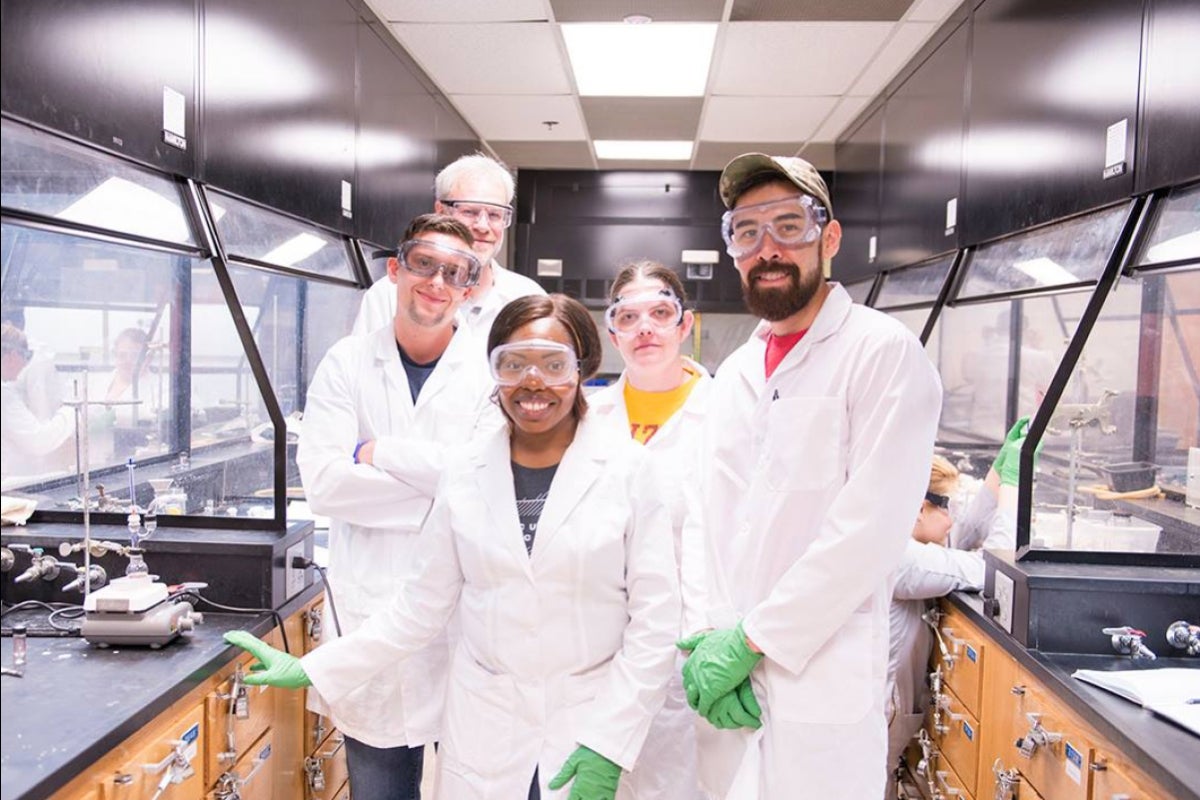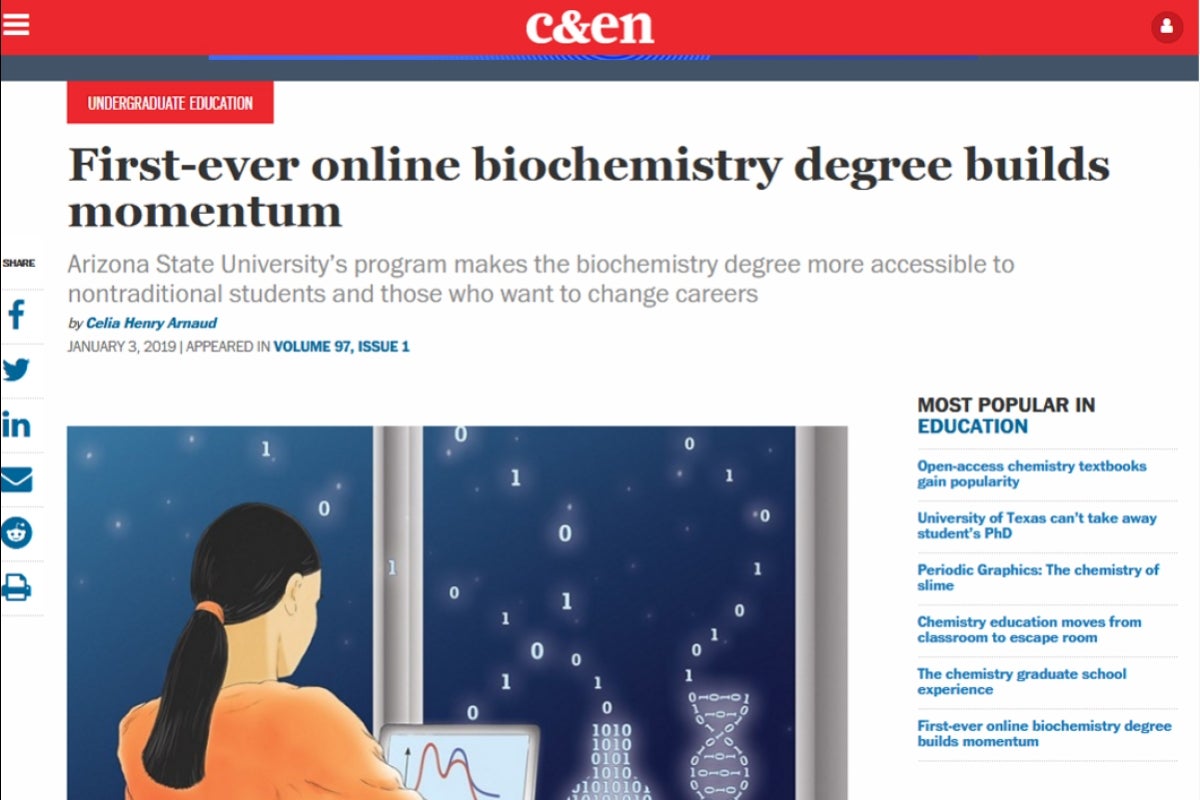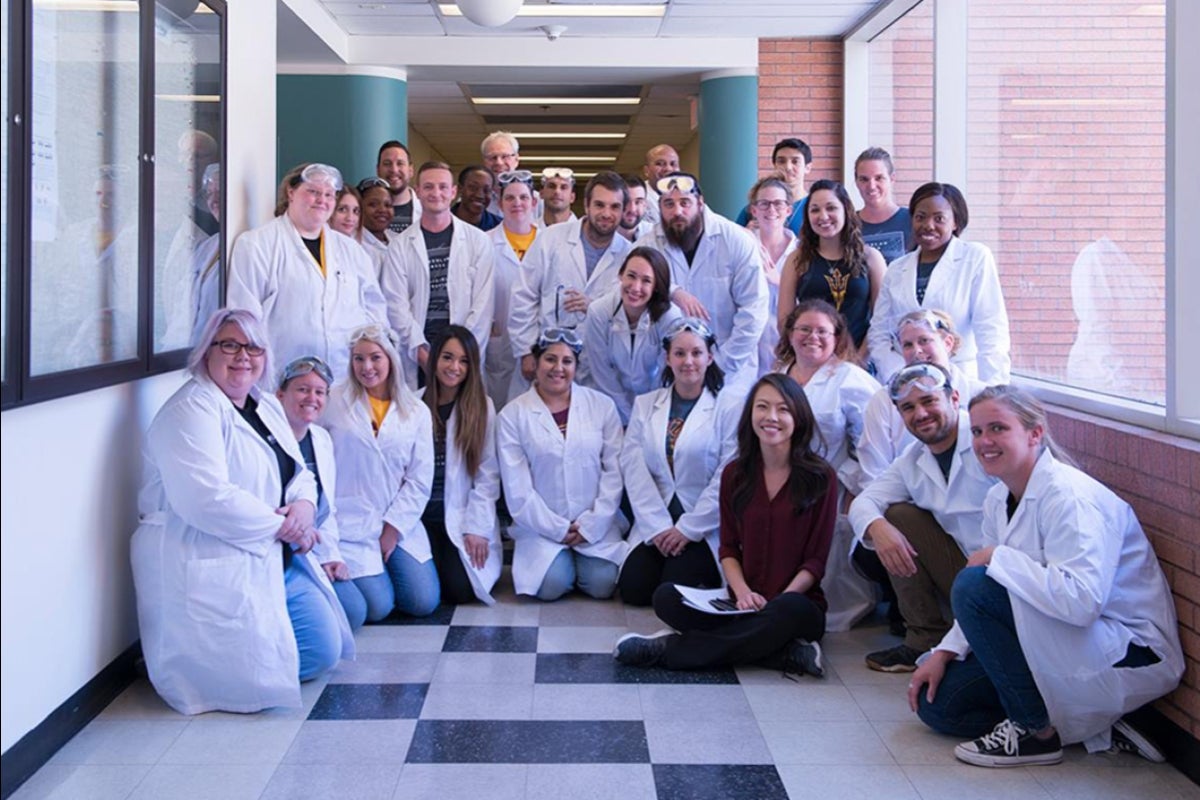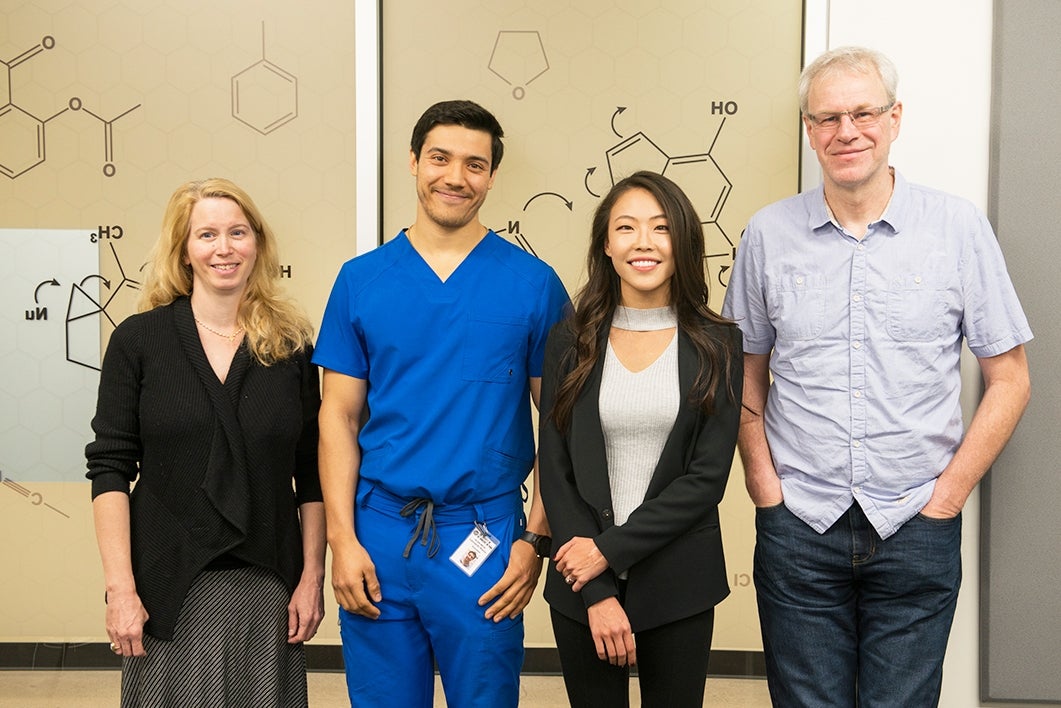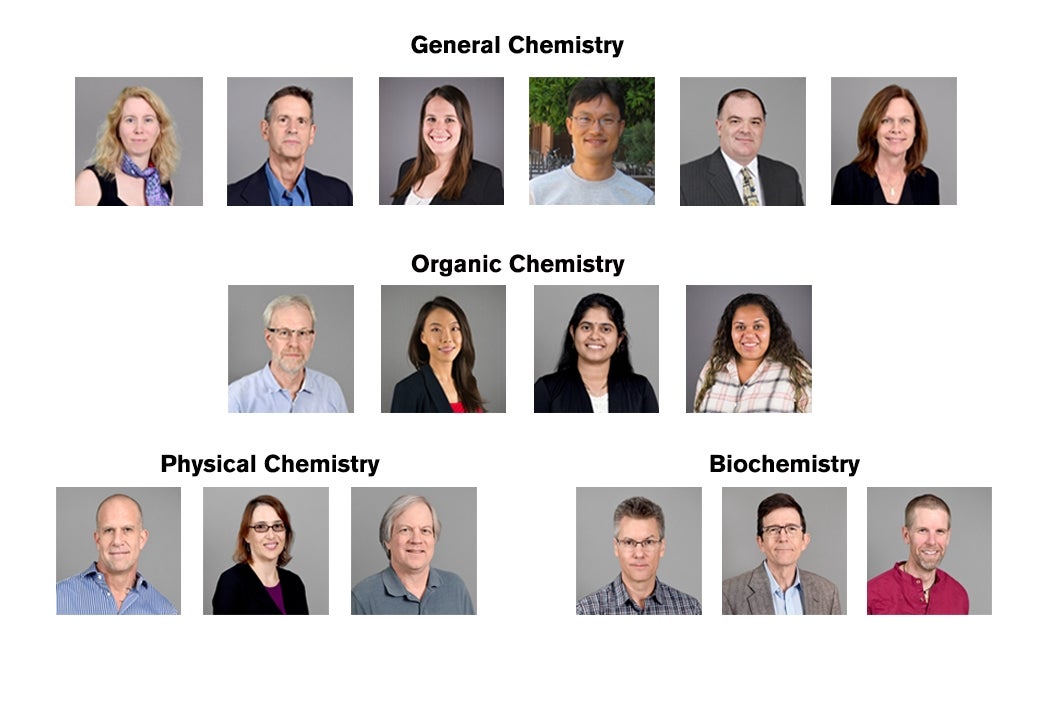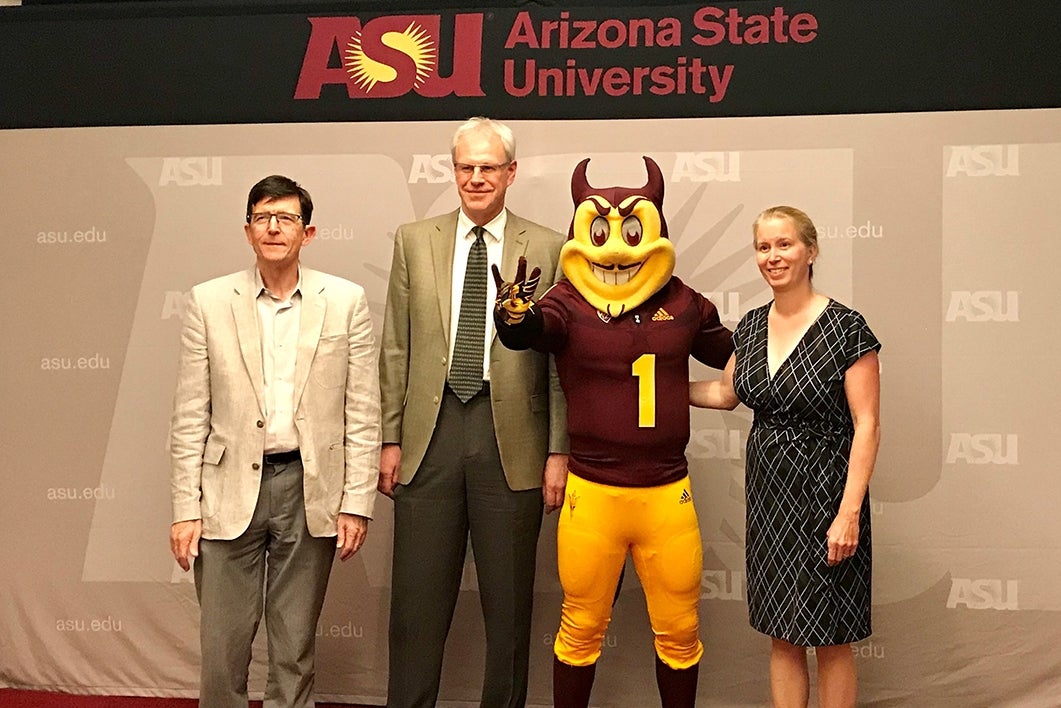Innovative online biochemistry degree recognized for increasing access to education

From left: Chair of the Founders' Day committee Rick Dircks, Christine K. Wilkinson, Anne Jones and Ian Gould of The College of Liberal Arts and Sciences’ School of Molecular Sciences and ASU President Michael Crow. Jones and Gould were jointly awarded the Faculty Teaching Achievement award for an innovative new approach to pre-med education. Photo by Joshua Spaulding
In 2016, the School of Molecular Sciences at Arizona State University embarked on a journey to change how biochemistry could be taught and create opportunities for students who thought that a bachelor’s degree was out of reach unless they went the traditional route of a brick-and-mortar school. That fall, pilot online general chemistry courses for biochemistry majors were offered for the first time, followed by online organic chemistry the following spring. These pilot courses were the precursor to a much larger project — to deliver a fully online biochemistry program with an in-person lab.
The following fall of 2017, the first fully online bachelor’s degree in biochemistry in the country made its debut at ASU.
What did it take to get this first-of-its-kind, innovative program off the ground? First, it required considerable organizational skills to pull the pieces together. Second, it had to deliver the same high quality education and experience as the on-ground program, and also address the problem of hands-on laboratory courses if it were to be a legitimate BS degree. Third, and perhaps most importantly, it required a committed and unified faculty and staff to believe in the idea and get behind it.
The program startup had many moving parts, each with its own unique challenges. The content for many of the courses had to be built from scratch. Faculty who had never taught in a primarily digital format had to learn how to teach online. A significant challenge was figuring out how to fund and staff the program before revenue was generated. The biggest challenge and unknown, however, was knowing how many students would actually enroll in an online biochemistry degree program that required them to come to Arizona in the summer for accelerated lab courses.
“There’s a reason the nation’s first biochem program came out of ASU,” said Ian Gould, director of ASU’s online biochemistry program. “ASU encourages us to be innovative and the environment is very supportive of trying new things. And to make this work, we knew we had to do things differently.”
Clinical professor and online program coordinator Ara Austin believes education should be flexible and provide opportunity to all students, traditional or otherwise.
"Providing access to quality education to all students was something I always believed to be important. This is why I believed the online biochemistry program was a step in the right direction for SMS and decided to take part in it," Austin said.
One of the most challenging parts of the program was supporting student needs when they came to Tempe for the lab portion of their degree. In addition to teaching in the program, Austin is responsible for organizing the on-ground lab courses, including housing, pre-health advising, meals and academic advisers for the students — even parking. The on-ground labs are the component that is primarily responsible for making the degree program unique — an online student has the same experience and support as an on-ground student: all critical pieces of the puzzle to ensure a true Sun Devil learning experience.
Another unique aspect is taking responsibility for helping the students make use of their degree. Austin is also involved in negotiations with the Association of American Medical Colleges to advocate for the students in the degree program who have aspirations in the medical field.
The philosophy behind the degree was to remain true to the ASU charter — to not only be the comprehensive public research university ASU is known for, but to make sure that the students from diverse backgrounds who sought out this program had all the tools and support they needed from the staff and faculty to be successful.
“We wanted to attract learners who otherwise couldn’t attend. Creating an authentic ASU science experience — they work in ASU labs, meet their cohorts and have that Sun Devil experience,” said Anne Jones, associate professor and associate director of academic affairs. “The result is a degree that is really very unique, it’s not about minting out new degree holders, instead it’s about educating a student and preparing them to go out into the workforce with valuable skills.”
The online biochemistry degree program has exceeded the expectations of all involved. It's gone from an enrollment of 50 students to more than 650 students just over a year later. But the courses and the program wouldn’t be here without the dedication of those faculty members who taught those first classes, many of whom stepped up to the plate and accepted extra teaching responsibilities without knowing exactly what to expect.
The faculty who initially created online general chemistry courses included Jones, Gary Cabirac, Ashli Morgan, Timo Park, Todd Windman and Pam Marks. Organic chemistry courses were the responsibility of Gould, Austin, Smitha Pillai and Marely Tejeda. Jeff Yarger, Marcia Levitus and Jim Allen created the physical chemistry courses, and Kevin Redding, Neal Woodbury and Scott Lefler built the biochemistry courses.
The degree program has attracted both local and national attention. Early this year the program was highlighted in the national periodical Chemical and Engineering News. And on March 20 at the annual Founders’ Day Awards ceremony hosted by the ASU Alumni Association, Jones and Gould were honored with the Faculty Teaching Achievement Award for being instrumental in establishing the program.
While Jones and Gould played a critical role in creating this online biochemistry degree — the Founders’ Day Teaching Achievement award is really a recognition of all the staff and faculty who played a part in making the online biochemistry degree program a success.
More Science and technology

Pioneering professor of cultural evolution pens essays for leading academic journals
When Robert Boyd wrote his 1985 book “Culture and the Evolutionary Process,” cultural evolution was not considered a true…

Lucy's lasting legacy: Donald Johanson reflects on the discovery of a lifetime
Fifty years ago, in the dusty hills of Hadar, Ethiopia, a young paleoanthropologist, Donald Johanson, discovered what would…

ASU and Deca Technologies selected to lead $100M SHIELD USA project to strengthen U.S. semiconductor packaging capabilities
The National Institute of Standards and Technology — part of the U.S. Department of Commerce — announced today that it plans to…
